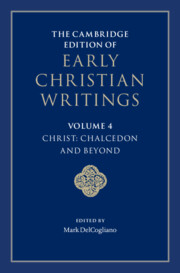Book contents
- The Cambridge Edition of Early Christian Writings
- The Cambridge Edition of Early Christian Writings
- The Cambridge Edition of Early Christian Writings
- Copyright page
- Contents
- Notes on Contributors
- Acknowledgments
- Note on the Texts and Translations
- Abbreviations
- Series Introduction
- Introduction
- Part I The Council of Chalcedon and Its Reception
- 1 Acts of the Home Synod at Constantinople (November 448):
- 2 Eutyches, Letter to Leo of Rome
- 3 Leo of Rome, Tome to Flavian of Constantinople
- 4 Acts of the Council of Chalcedon (October 451):
- 5 Leo of Rome, The Second Tome (Letter to Emperor Leo)
- 6 Timothy Aelurus, Petition to Emperor Leo
- 7 Timothy Aelurus, Against the Council of Chalcedon
- 8 Timothy Aelurus, Letter to Claudianus
- 9 Emperor Zeno, The Henotikon
- 10 Pseudo-Dionysius the Areopagite, Fourth Letter
- 11 Narsai, Metrical Homily on “the Word became Flesh” (John 1:14)
- 12 Narsai, Selections from the Metrical Homilies on the Nativity and on the Epiphany
- 13 Philoxenos of Mabbug, Letter to the Monks of Senoun (Selections)
- 14 Jacob of Serugh, Metrical Homilies on the Name “Emmanuel” and on How the Lord is Known in Scripture as Food and Drink
- 15 Jacob of Serugh, Metrical Homily on the Council of Chalcedon
- 16 Jacob of Serugh, Letter 14
- 17 Simeon of Beth Arsham, Letter on Bar Ṣawmā and the Heresy of the Nestorians
- 18 Emperor Justinian, Edict on the Orthodox Faith (Selection)
- 19 Acts of the Second Council of Constantinople (May–June 553):
- Part II Christological Perspectives after Constantinople II
- Suggestions for Further Reading
- Scriptural Index
13 - Philoxenos of Mabbug, Letter to the Monks of Senoun (Selections)
from Part I - The Council of Chalcedon and Its Reception
Published online by Cambridge University Press: 11 February 2022
- The Cambridge Edition of Early Christian Writings
- The Cambridge Edition of Early Christian Writings
- The Cambridge Edition of Early Christian Writings
- Copyright page
- Contents
- Notes on Contributors
- Acknowledgments
- Note on the Texts and Translations
- Abbreviations
- Series Introduction
- Introduction
- Part I The Council of Chalcedon and Its Reception
- 1 Acts of the Home Synod at Constantinople (November 448):
- 2 Eutyches, Letter to Leo of Rome
- 3 Leo of Rome, Tome to Flavian of Constantinople
- 4 Acts of the Council of Chalcedon (October 451):
- 5 Leo of Rome, The Second Tome (Letter to Emperor Leo)
- 6 Timothy Aelurus, Petition to Emperor Leo
- 7 Timothy Aelurus, Against the Council of Chalcedon
- 8 Timothy Aelurus, Letter to Claudianus
- 9 Emperor Zeno, The Henotikon
- 10 Pseudo-Dionysius the Areopagite, Fourth Letter
- 11 Narsai, Metrical Homily on “the Word became Flesh” (John 1:14)
- 12 Narsai, Selections from the Metrical Homilies on the Nativity and on the Epiphany
- 13 Philoxenos of Mabbug, Letter to the Monks of Senoun (Selections)
- 14 Jacob of Serugh, Metrical Homilies on the Name “Emmanuel” and on How the Lord is Known in Scripture as Food and Drink
- 15 Jacob of Serugh, Metrical Homily on the Council of Chalcedon
- 16 Jacob of Serugh, Letter 14
- 17 Simeon of Beth Arsham, Letter on Bar Ṣawmā and the Heresy of the Nestorians
- 18 Emperor Justinian, Edict on the Orthodox Faith (Selection)
- 19 Acts of the Second Council of Constantinople (May–June 553):
- Part II Christological Perspectives after Constantinople II
- Suggestions for Further Reading
- Scriptural Index
Summary
Philoxenos of Mabbug (ca. 440s–523) wrote prolifically in defense of his theological positions. Especially important to him was the unity of Christ’s nature, a position he thought that the most powerful Christians of his day had mistakenly abandoned. Written toward the end of his life and after his removal from his office as bishop in favor of a supporter of the Chalcedonian Definition, this letter outlines the fine details of Philoxenos’s miaphysite Christology. For him, the process by which the Word had become human was key for understanding the entirety of Christianity; the questions about how and when this “humanification,” as he called it, had happened are pursued in the letter to an extent that can seem excessive, but the mechanics of humanification mattered to Philoxenos for two reasons. First, a mistaken idea about this process could lead one to think wrongly about the status of Christ, that of his human mother Mary, and about the efficacy of salvation itself. Second, getting the details of humanification wrong could lead people to think that, in addition to the Trinity of Father, Son, and Holy Spirit, there was a fourth deity, named the Lord or the Son, who resides outside the Trinity.
- Type
- Chapter
- Information
- The Cambridge Edition of Early Christian Writings , pp. 239 - 265Publisher: Cambridge University PressPrint publication year: 2022



